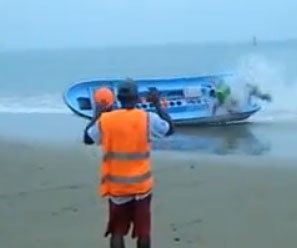
Hit the beach pal!!! This can happen to anyone…
The fishing report portal featuring news from all over our fishing world….

The Mozambican state is suffering annual loses of revenue of over a billion meticais ($30 million) from illegal fishing, according to the National Director of Fisheries Inspection, Manuel Castiano.
According to Castiano 2,000 tonnes of fisheries produce are taken from Mozambican waters every year by vessels fishing illegally. “Illegal fishing is not just an economic concern, but also a social one”, said Castiano, “since more than 100,000 Mozambicans depend directly on fishing for their livelihood, and a further 530,000 depend indirectly”.
Illegal fishing is preventing the fisheries sector from increasing its contribution to Mozambique’s Gross Domestic Product, he added. Currently fisheries only contribute three per cent to GDP. Inter-sector cooperation, including with the defence and security forces, and strengthening the human and material resources devoted to fighting illegal fishing, were the way forward to bring the situation under control, said Castiano.
Mozambique is far from the only African country in this situation. Africa as a whole is estimated to be losing €785 million (slightly more than a billion US dollars) every year to illegal fishing.
Courtesy AIM

Hey Sean, Went out this morning again with the Russians who still only want to light tackle game fish and we caught and released a bunch of fish this morning including a sailfish, some bonito, rainbow runner, pinkhandle barracuda, bluefin kingfish and cuda. Mid morning it went quiet and I finally managed to persuade them to put a spread of Marlin lures out. We set it just after 10am and fifteen minutes later BANG, big strike on the shotgun lure and a hookup on a fish that literally went ballistic. Thirty minutes later we had the estimated 200 pound Black by the boat for a release. Amazingly the guests wanted to come back to the resort after that….go figure!!!! Happy day
s, cheers…
7 November 2012
The Mozambican government has declared two small archipelagos, rich in marine wild life, as areas of environmental protection.
The archipelagos are known, as the “Ilhas Primeiras” (First Islands) and “Ilhas Segundas” (Second Islands). The former are located off the coast of Pebane district, in the central province of Zambezia, while the second lie between the coastal districts of Angoche and Moma, in the northern province of Nampula.
Each archipelago consists of five islands.
Government spokesperson, Deputy Justice Minister Alberto Nkutumula, explained that the government has decided to protect the two archipelagos to conserve coastal and marine habitats, maintain biodiversity, and ensure the renewal of fisheries resources.
He pointed out that the islands are important for endangered species. They contain nesting sites for turtles, and are breeding grounds for dugongs.
“There are also coral reefs and mangrove forests, which are extremely importance for the reproduction of marine species”, Nkutumula added.
Some economic activities can still be undertaken on the islands, but they will require special licences. Nkutumula said a management plan will be drawn up, listing precisely what activities are allowed in the archipelagos.
Fishermen to receive government loans
thesardine.co.za
7 November 2012
Over two hundred fishery projects in Mozambique will next year receive loans for the production, preservation, processing, transportation and marketing of fish, under a programme implemented by the Institute for the Development of Small Scale Fisheries (IDPPE). The loans will be given to 30 communities in Gaza province, 15 in Inhambane, 50 in Sofala, 20 in Zambezia, 40 in Manica, 40 in Cabo Delgado and seven in Nampula. In addition, over a thousand people will receive training throughout the country in subjects such as the use of fishing gear, aquaculture, fish processing, salting and drying techniques, and boat building. One of the biggest problems facing fishermen is that without capital to invest in fish processing and storage the catch has to be sold shortly after landing. The programme is intended to address this issue. Another aspect of the programme is the provision of over a hundred motorised fishing boats to encourage fishermen to move away from the coast in an attempt to reduce the pressure on fishery resources and coral reefs. About 85 per cent of Mozambique’s total fisheries production comes from artisanal fishermen, directly or indirectly employing about 300,000 people.